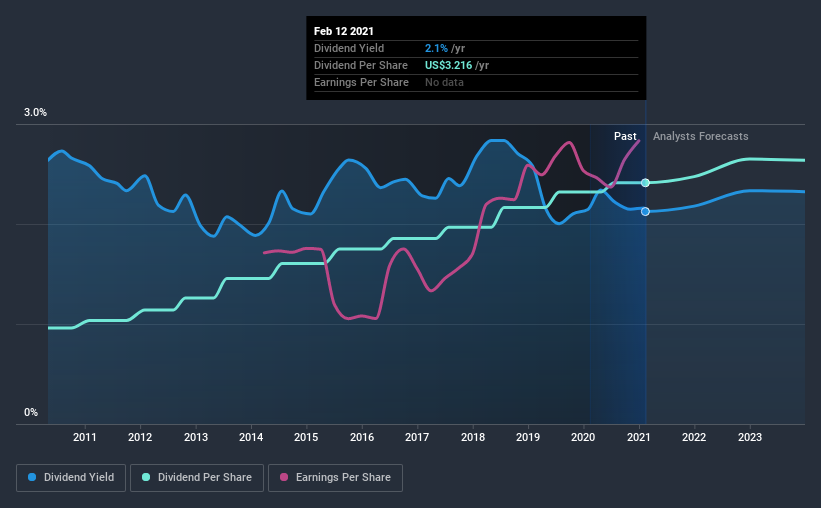Should You Buy The Hershey Company (NYSE:HSY) For Its Upcoming Dividend?
It looks like The Hershey Company (NYSE:HSY) is about to go ex-dividend in the next 4 days. Investors can purchase shares before the 18th of February in order to be eligible for this dividend, which will be paid on the 15th of March.
Hershey's next dividend payment will be US$0.80 per share. Last year, in total, the company distributed US$3.22 to shareholders. Looking at the last 12 months of distributions, Hershey has a trailing yield of approximately 2.1% on its current stock price of $151.38. We love seeing companies pay a dividend, but it's also important to be sure that laying the golden eggs isn't going to kill our golden goose! As a result, readers should always check whether Hershey has been able to grow its dividends, or if the dividend might be cut.
Check out our latest analysis for Hershey
Dividends are usually paid out of company profits, so if a company pays out more than it earned then its dividend is usually at greater risk of being cut. Hershey paid out 51% of its earnings to investors last year, a normal payout level for most businesses.
Click here to see the company's payout ratio, plus analyst estimates of its future dividends.
Have Earnings And Dividends Been Growing?
Businesses with strong growth prospects usually make the best dividend payers, because it's easier to grow dividends when earnings per share are improving. Investors love dividends, so if earnings fall and the dividend is reduced, expect a stock to be sold off heavily at the same time. It's encouraging to see Hershey has grown its earnings rapidly, up 21% a year for the past five years. Management appears to be striking a nice balance between reinvesting for growth and paying dividends to shareholders. Earnings per share have been growing quickly and in combination with some reinvestment and a middling payout ratio, the stock may have decent dividend prospects going forwards.
Many investors will assess a company's dividend performance by evaluating how much the dividend payments have changed over time. Hershey has delivered 9.7% dividend growth per year on average over the past 10 years. We're glad to see dividends rising alongside earnings over a number of years, which may be a sign the company intends to share the growth with shareholders.
Final Takeaway
Has Hershey got what it takes to maintain its dividend payments? Earnings per share are growing at an attractive rate, and Hershey is paying out a bit over half its profits. Hershey ticks a lot of boxes for us from a dividend perspective, and we think these characteristics should mark the company as deserving of further attention.
On that note, you'll want to research what risks Hershey is facing. Case in point: We've spotted 1 warning sign for Hershey you should be aware of.
We wouldn't recommend just buying the first dividend stock you see, though. Here's a list of interesting dividend stocks with a greater than 2% yield and an upcoming dividend.
This article by Simply Wall St is general in nature. It does not constitute a recommendation to buy or sell any stock, and does not take account of your objectives, or your financial situation. We aim to bring you long-term focused analysis driven by fundamental data. Note that our analysis may not factor in the latest price-sensitive company announcements or qualitative material. Simply Wall St has no position in any stocks mentioned.
Have feedback on this article? Concerned about the content? Get in touch with us directly. Alternatively, email editorial-team (at) simplywallst.com.

 Yahoo Finance
Yahoo Finance 
